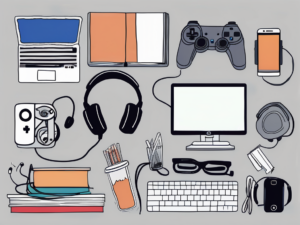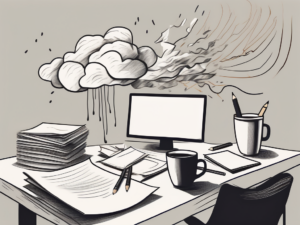Have you ever found yourself unable to focus when you’re not working? It’s a common struggle that many people face. Whether it’s during your leisure time, spending quality moments with loved ones, or simply trying to relax, the inability to focus can have a significant impact on your overall well-being. Understanding the problem and finding effective strategies to improve focus outside of work can greatly enhance your personal and professional life.
Understanding the Problem: Why Can’t I Focus?
There are several factors that contribute to the challenge of focusing outside of work. To truly address this issue, it’s important to delve into the science behind concentration and relaxation, as well as the role that work plays in mental stimulation.
The Science Behind Concentration and Relaxation
Concentration and relaxation are intertwined facets of our cognitive function. When we are focused, our brains are fully engaged, allowing us to absorb information, make decisions, and complete tasks efficiently. On the other hand, relaxation is essential for rejuvenating our minds, reducing stress, and promoting creativity.
But have you ever wondered what happens in our brains when we struggle to focus? It turns out that an imbalance in our cognitive state may be the culprit. Our brains may be overactive, making it difficult to relax and concentrate. This overactivity can be influenced by various factors such as stress, lack of sleep, or even excessive caffeine consumption. By understanding the underlying science, we can develop effective strategies to restore this balance.
The Role of Work in Mental Stimulation
Work plays a significant role in stimulating our minds. It provides structure, challenges, and a sense of purpose. However, when we become overly reliant on work for mental stimulation, we may find it challenging to redirect our focus towards other aspects of our lives.
Moreover, the demands of work often leave little time for self-care and leisure activities. Our minds may struggle to transition from the work mindset to a state of relaxation, as we constantly feel the need to be productive. It’s important to remember that relaxation and leisure are not wasted time, but rather essential for maintaining focus and overall well-being. Finding a healthy work-life balance is crucial in allowing our minds to recharge and be ready for the challenges that lie ahead.
So, the next time you find yourself struggling to focus outside of work, remember the intricate relationship between concentration, relaxation, and the role that work plays in mental stimulation. By understanding the science behind it and finding a healthy balance, you can regain control of your focus and lead a more fulfilling life.
The Impact of Lack of Focus on Personal Life
The inability to focus outside of work can have far-reaching consequences, affecting both personal and professional relationships, as well as your mental and physical health. Understanding these implications can motivate positive change and prompt you to seek effective strategies to regain your focus.
It’s important to recognize that lack of focus doesn’t just impact your work life but can seep into every aspect of your personal life. From forgetting important dates to being mentally absent during crucial moments, the repercussions can be significant. This can lead to missed opportunities for personal growth and hinder your ability to fully immerse yourself in the present moment.
Effects on Relationships and Social Life
The inability to fully engage with loved ones can strain relationships and diminish the quality of social interactions. When our minds are preoccupied or overwhelmed, we may find it difficult to be present in conversations and enjoy meaningful connections.
Moreover, a lack of focus can result in missed social cues and an inability to empathize effectively with others. This can create misunderstandings and distance in relationships, impacting not only your personal life but also your overall sense of well-being.
By improving focus outside of work, you can cultivate stronger relationships, enhance communication, and create lasting memories with those who matter most to you.
Implications for Mental and Physical Health
The inability to focus can take a toll on our mental and physical well-being. Persistent distractions and racing thoughts can lead to heightened stress levels, anxiety, and even insomnia. Additionally, the inability to relax and recharge can result in decreased energy levels and a lack of overall vitality.
Furthermore, a lack of focus can contribute to a sense of constant overwhelm, making it challenging to find moments of peace and clarity. This can impact your mental health by increasing feelings of frustration and inadequacy, ultimately affecting your self-esteem and confidence.
By actively seeking strategies to improve focus outside of work, you can alleviate these negative effects and enhance both your mental and physical health.
Common Causes of Inability to Focus Outside Work
Understanding the common causes of the inability to focus outside of work is the first step towards developing effective strategies to overcome this challenge.
It’s important to recognize that the inability to focus outside of work can stem from a variety of factors, both internal and external. While work-related stress and demands certainly play a significant role, other aspects of our lives can also impact our ability to concentrate and engage in non-work activities.
Overworking and Burnout
Working long hours and neglecting self-care can lead to burnout. When we push ourselves beyond our limits, our mental and physical resources become depleted, making it difficult to focus and engage in activities outside of work.
To combat this, it’s essential to set boundaries, prioritize self-care, and create a healthy work-life balance that allows for adequate rest and rejuvenation.
Additionally, incorporating mindfulness practices such as meditation or yoga into your routine can help alleviate stress and improve your ability to focus on tasks outside of work.
Lack of Work-Life Balance
When work consumes a significant portion of our lives, it’s easy for other aspects to take a backseat. A lack of work-life balance can leave us feeling overwhelmed and unable to shift our focus away from work-related matters.
By actively scheduling time for leisure activities, hobbies, and quality time with loved ones, we can create a more harmonious balance between work and personal life.
Furthermore, engaging in regular physical exercise can not only improve your overall well-being but also boost your cognitive function, making it easier to concentrate and focus on non-work activities.
Strategies to Improve Focus Outside Work
Fortunately, there are several effective strategies that can help you improve your focus outside of work.
When it comes to enhancing focus outside of work, it’s essential to consider the impact of physical exercise on mental clarity. Engaging in regular physical activity not only benefits your physical health but also plays a significant role in sharpening your focus and cognitive abilities. Exercise has been shown to increase blood flow to the brain, promoting the growth of new brain cells and improving overall brain function.
Mindfulness and Meditation Techniques
Practicing mindfulness and meditation can help calm a busy mind and cultivate an enhanced ability to focus. Taking a few moments each day to engage in these practices can have a profound impact on your ability to be present and fully engaged in various aspects of your life.
By incorporating mindfulness and meditation into your daily routine, you can train your mind to stay focused, stabilize your attention, and reduce distractions.
Furthermore, incorporating elements of mindfulness into your daily activities, such as mindful eating or mindful walking, can help you stay grounded and attentive in the present moment, leading to improved focus and productivity.
The Importance of Downtime and Leisure Activities
Engaging in leisure activities and granting yourself regular downtime is crucial for recharging your mind and body. By consciously making time for activities that bring you joy and relaxation, you give yourself the opportunity to enhance focus and creativity.
Take up a hobby, explore nature, or simply indulge in activities that nourish your soul. By doing so, you create a space for inspiration and renewed focus in your life.
Moreover, prioritizing quality sleep is paramount in improving focus and cognitive function. Adequate rest allows your brain to consolidate memories, process information, and rejuvenate, ultimately leading to enhanced focus, problem-solving skills, and decision-making abilities.
Seeking Professional Help
There may be instances when seeking professional help becomes necessary to address focus issues outside of work. Recognizing when it’s time to consult a mental health professional is an important step towards finding lasting solutions.
When to Consult a Mental Health Professional
If your lack of focus persists despite your best efforts and begins to interfere significantly with your daily life, it may be beneficial to seek guidance from a mental health professional. They can help identify any underlying conditions and provide tailored strategies to improve your focus.
Therapies and Treatments for Focus Issues
A mental health professional can offer various therapies and treatments to help improve your focus outside of work. These may include cognitive-behavioral therapy (CBT), mindfulness-based therapies, or other evidence-based approaches that address the root causes of your focus issues.
Remember, seeking professional help is a proactive step towards reclaiming your focus and enhancing your overall well-being.
In Conclusion
The challenge of not being able to focus when you’re not working is a common struggle that can have significant implications for our personal and professional lives. By understanding the reasons behind this difficulty and implementing effective strategies, such as mindfulness, leisure activities, and seeking professional help when needed, you can improve focus, cultivate a healthy work-life balance, and lead a more fulfilling life.
Remember, regaining your focus is a journey that requires patience and perseverance. Be kind to yourself and celebrate every small victory along the way. You have the power to create a life where focus and fulfillment coexist harmoniously.



